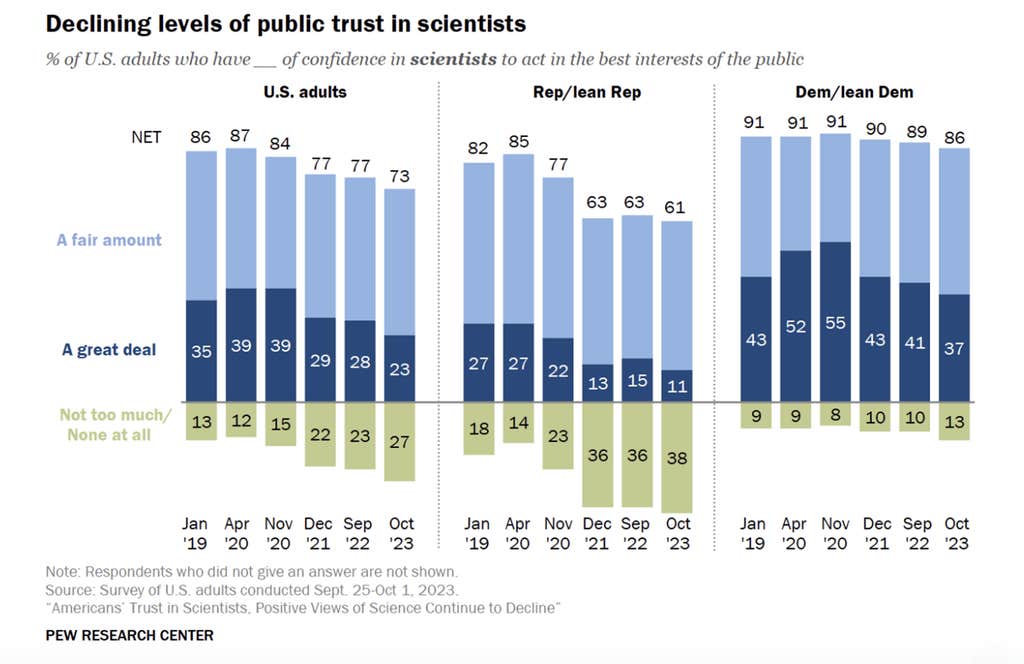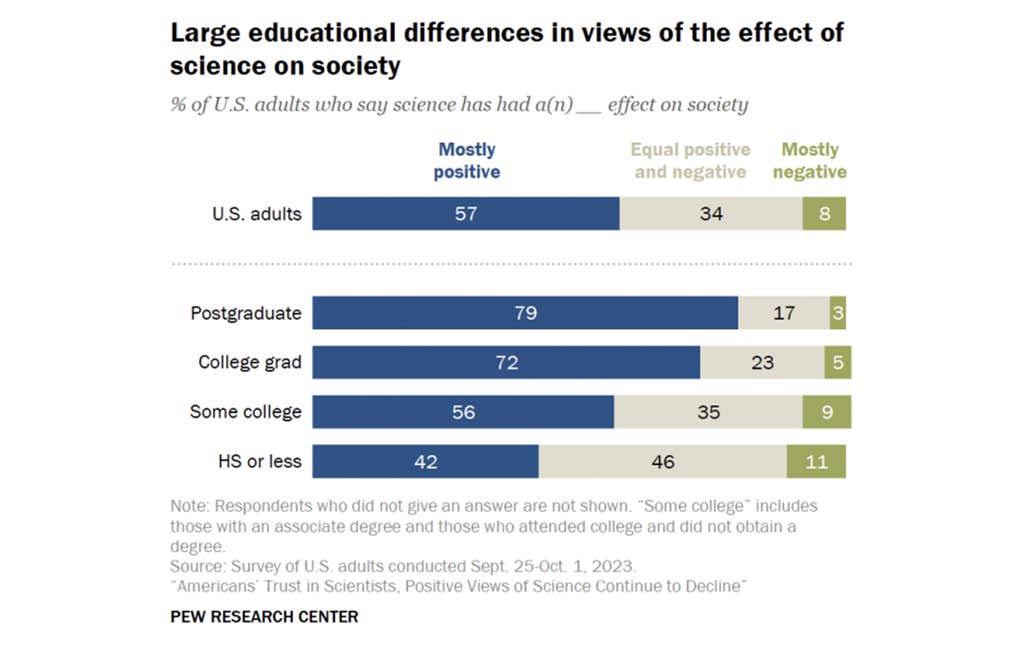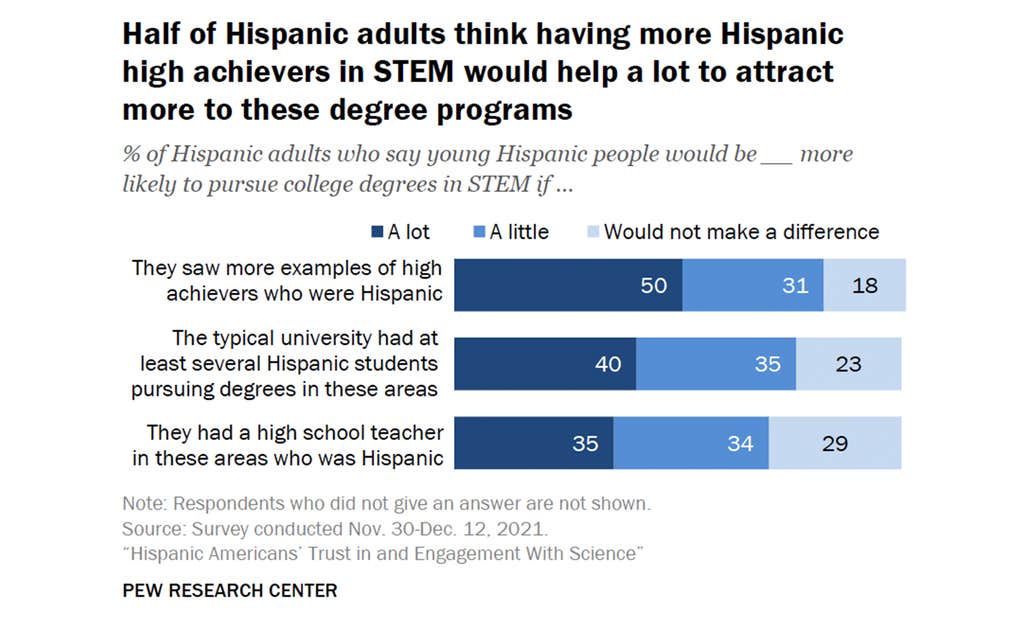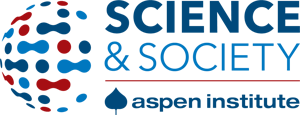
After a summer of political drama in the United States—including two assassination attempts on former President Donald Trump and President Joe Biden’s surprise decision to end his re-election bid—it may seem unlikely that there’s any aspect of the upcoming election that has not been thoroughly picked over in news coverage and social media chatter. But in politics, as in so many aspects of life, the things that people talk about do not tell the full story.
On the surface, this year’s presidential election is focused heavily on inflation, border security, and reproductive rights. Dig more deeply, though, and many critical issues for science and technology policy are also at stake. Those issues may not make headlines, but they have a tremendous impact on the future direction of the economy, the environment, national security, and the overall state of public health and well-being. Today’s science policy decisions will lay the groundwork for the world we live in 10, 20, and even 50 years in the future.
As a pollster, I have spent the better part of my career looking at the factors driving voters’ choices at the ballot box and, simultaneously, at the factors influencing people’s views of science. The polls my colleagues and I have conducted help us see the patterns in what the public, as a whole, cares about and how they see the choices ahead. Our work also points to emerging changes that could have lasting consequences for science in the U.S.
Attitudes toward science and politics used to be easy to regard as separate threads in the American psyche, but in recent years I have noticed the two become intertwined. The polling I see from my former colleagues at Pew Research Center and from other organizations also turns up important differences in science attitudes among groups in society. Those divergences could become increasingly consequential for the place of science in society. Political party affiliation is one major factor, but education, race and ethnicity, and generational cohort are also important.
What I see in recent polls provides a different perspective on what is at stake in this election and on what kind of future the public might choose—or inherit.
The COVID-19 pandemic catapulted science and scientists to the forefront of public attention in 2020 and set the stage for Biden’s election over Trump that fall. But controversy over the government’s handling of the outbreak quickly triggered sharp and lasting political divisions.
In recent years, my colleagues and I have documented a widening division of opinion between political groups over how much to trust scientists. Pew Research Center surveys find the share of Republicans and Republican-leaning independents who have a negative view of scientists—saying they have “not too much” or “no confidence” in scientists to act in the public’s best interests—doubled, from 18 percent in January 2019 to 38 percent in October of 2023. There has been a corresponding drop in the share of Republicans and leaning Republicans with strong trust in scientists, though 61 percent of them hold at least softly positive views of scientists in the 2023 survey. In contrast, the vast majority of Democrats and leaning Democrats (86 percent as of October 2023) express at least softly positive levels of confidence in scientists, and the share with the strongest level of trust has returned to pre-pandemic levels.

These polling data capture a growing segment of the public that tends to regard science with a skeptical eye and that is correspondingly inclined to challenge findings and recommendations from scientists. Such skeptical sentiments could play out in a myriad of ways. They may lend support to proposals, touted in the “Project 2025” plan that incorporates advice from former advisers to former President Trump, to replace many of government’s career civil servants with political appointees. The influence of science advisors and science-based policymaking is already being diminished by a U.S. Supreme Court ruling that ended a decades-old precedent of legal deference to a federal agency’s interpretation of statutes, known as the Chevron deference doctrine. That 2024 ruling restricts the role of government scientists in guiding how policies can best protect public health and safety.
Political divisions over climate policy, which have been ongoing since the 1970s, suggest that once political divisions over science emerge, they tend to get wider and more hardened over time unless there is a concerted effort to address the sources of these divides. Widened divisions then can obstruct civic discourse and constructive action. Of course, different viewpoints are necessary in civic discourse to at least some degree. An open discussion of scientific evidence and science-related policy recommendations is valuable regardless of one’s views toward specific rules and regulations.
A key question this November will be how well Trump and other GOP candidates do at holding onto support among working-class voters. Once considered a stronghold for the Democratic Party, working-class voters (defined in simple terms as those who haven’t earned a four-year college degree), particularly white working class, helped deliver Trump’s win in 2016 and have become an important part of the GOP coalition heading into 2024.
A less frequently discussed shift started years earlier, when voters with a college degree, especially those with a postgraduate education, started lining up squarely with the Democratic Party. Exit polls conducted for the National Election Pool of media organizations found that postgraduates were split about evenly between the Democratic and Republican presidential candidates back in 1988. As of 2004, voters with a postgraduate education were upward of 10 percentage points more likely to vote for the Democratic presidential candidate. In 2016, that advantage grew to more than 20 points. Americans today are increasingly divided by the way that their educational experiences tie with their political identities and perspectives.
Education is also strongly related to people’s views toward science. Across Pew Research Center surveys collected since 2016, my former colleagues and I routinely found a strong correlation between education and confidence in scientists to act in the public’s interests, in support for federal funding of scientific research, and in holding the view that science’s impact on society has been largely positive. As of October 2023, about 8-in-10 U.S. adults with a postgraduate education said the effect of science on society has been mostly positive (79 percent) compared with 42 percent of those who had a high school degree or less schooling. In a 2020 analysis on behalf of the National Science Foundation, John Besley of Michigan State University, and Derek Hill of the National Center for Science and Engineering Statistics concluded that “overall, the best predictor of positive views about S&T [science and technology] in the United States is education.”

People across all education levels can and do engage with science in everyday life. Astronomy enthusiasts and bird watchers do not need years of higher education to appreciate the wonders of the world. Many professions—such as electricians, car mechanics, and medical technicians—require a strong mastery of principles in science acquired through training or self-study. Nevertheless, U.S. adults with a college degree or higher are more likely to be exposed to science-related experiences such as taking part in a community science project or going to a museum.
It’s concerning that the people who most strongly support and engage with science increasingly draw from the portion of the population with a college or higher degree. That pattern reinforces an exclusionary image for those with no such degree that science is not for “people like me.” Education-based differences over the value of science and scientists in society are poised to widen further and remain part of the public opinion landscape for years to come.
Hispanic adults make up a growing share of the American electorate, and they account for a sizable share of the electorate in several battleground states, including more than 1-in-5 eligible voters in Arizona and Nevada. Polling data show that views toward science and politics are changing rapidly within this large and diverse population. Those changes are often obscured within polling data that look only at the country’s population as a whole.
Prior to 2020, polls have shown a roughly 2-to-1 advantage for Democratic candidates among Hispanic voters nationally. Recent surveys suggest a softening of support for the Democratic Party among this group. There has been a 10 percentage-point drop in the share of Hispanic adults who consider themselves Democrats or independents who lean to the Democratic Party between 2020 and 2023, according to Gallup surveys. It is not clear what is driving the shift in political allegiances or whether it is occurring across all segments of this diverse group.
According to survey data, Hispanic Americans’ views of science have also been changing. A 2023 Pew Research Center survey found 49 percent of Hispanic adults saying that the effect of science on society was mostly positive, while 44 percent said it was an equal mix of positive and negative effects, and 7 percent said the effect was mostly negative. The share of Hispanic adults saying the effect of science on society was mostly positive dropped by double digits from 63 percent in February 2021 and 66 percent in January of 2019. This shift highlights a need for more attention to the factors influencing Hispanic-Americans’ views of and experiences with science.
In a survey and focus groups with Hispanic-Americans by Pew Research Center in 2021, Mark Hugo Lopez and I found that the lack of representation in science and allied fields significantly influenced how people saw and experienced science. A majority of Hispanic-Americans (68 percent) describe themselves as being at least somewhat interested in following science news. But just 26 percent of Hispanic adults rated scientists as a professional group as “very welcoming” of Hispanic people in these roles; 29 percent said they are not too welcoming or are not at all welcoming of Hispanic people and another 42 percent said that scientists are somewhat welcoming of Hispanic people in these jobs. Most Hispanic adults said that seeing more high-achieving Hispanics in science, technology, engineering, and mathematics (STEM) would help a lot (50 percent) or a little (31 percent) in attracting more Hispanic people to pursue college degrees in STEM fields.

Evidence to date suggests that younger adults offer an important opportunity to deepen engagement with science in the U.S., with the potential to influence civic discourse for decades to come.
In a 2024 survey conducted by Gallup and the Walton Family Foundation, members of Generation Z (covering ages 12 to 27) stood out for their relatively high levels of trust in scientists, as they also did in 2023. Like the U.S. population in general, this group expressed low levels of trust in Congress and in the news media. But 73 percent of Gen Z adults ages 18 to 27, and 65 percent of Gen Z youth, said they had a great deal or quite a lot of trust in science. The share of Gen Z with the strongest level of trust—34 percent with “a great deal of trust” in scientists—was far above that for any other groups and institutions rated. Just 13 percent of Gen Z expressed the same level of trust about the military.
Younger adults have been tilting toward the Democratic party in recent years. There’s no guarantee that those voters will make a difference in the election outcome, however. Historically, younger adults are the least likely age group to register and submit a ballot. One X factor this election is whether Taylor Swift’s endorsement of Vice President Kamala Harris will help persuade the eligible voters among Swift’s more than 240 million Instagram followers to submit a ballot. The New York Times reported that within 24 hours of her post on X, some 405,999 people followed her link to Vote.gov, which helps people register and check their voter registration status.
Younger adults are often highly motivated to engage with issues related to pressing problems in their communities. One survey of voters under age 34 in November of 2023 highlighted gun violence prevention (26 percent), addressing climate change (26 percent), and expanding access to abortion (19 percent) as the top issue priorities behind the economy. A separate analysis from a New York Times/Siena College poll found that reproductive rights has “overtaken the economy as the single most important issue to their vote” among women younger than 45.
Members of Gen Z also express high levels of interest in science-related jobs. Three-quarters of these individuals, surveyed by Gallup and the Walton Family Foundation in 2023, expressed at least some interest in a future career related to a STEM field, offering an opportunity for more engagement. Girls Who Code and programs like it are helping to increase diversity in technology and other STEM careers. Efforts such as the Aspen Institute’s Our Future is Science mentorship program help youth connect scientific work with social justice. But for the more than 30 million U.S. adults under age 24, turning science interest into a lifelong vocation will require this diverse generation to see STEM careers as offering accessible and rewarding career opportunities.
Partisan attitudes tell only part of the story. There’s an overlooked opportunity to find common goals in areas of science that connect to our daily lives, even if voters disagree over specific policy approaches for achieving those goals.
The wide differences along political lines in public views about climate, energy, and the environment often stand out. But when my Pew Research Center colleagues and I interviewed people in the U.S. who voiced little urgency to address climate change, we heard support for the principles of biodiversity and caring for the planet, even among people who expressed reservations about government policies in these areas. In the words of one man in his 20s, “I think it’s very important to not overdevelop so there’s still space for natural habitats.” A man in his 50s said, “Let’s not litter. Let’s have good clean water. Let’s not do anything that’s going to hurt our planet.”
Similarly, we find a sense of collective interest in advancing quality and affordable health care. A June 2023 Pew Research Center survey found a majority of both Democrats and Republicans (64 percent of Americans, overall) said the affordability of healthcare is a “very big problem” in the country today. A survey by Harvard T.H. Chan School of Public Health in November 2023 found that four health care issues garnered strong support across all segments of the public: preventing chronic diseases (83 percent), preventing and addressing mental illness (80 percent), reducing infant mortality (79 percent), and preventing and addressing opioid and other substance addiction (72 percent).
Concerns over the rapid emergence of artificial intelligence, such as ChatGPT, also cut across traditional divisions in society. The share of Americans describing themselves as “more concerned than excited” about the increased use of artificial intelligence in daily life went from 38 percent in 2022 to 52 percent in 2023 according to Pew Research Center surveys. These surveys highlight a collective anxiety about a future dominated by AI. My colleagues and I have seen that refrain again and again in public responses to emerging tech. The response reflects a widely shared belief in holding human agency over scientific and technological developments.
Given these underlying commonalities—value for a clean and healthy environment, support for affordable healthcare, and concerns over AI—it makes sense that reaching for common ground pays off for legislative leaders. Researchers with the Center for Effective Lawmaking analyzed the factors behind legislative success, scoring legislators based on 15 metrics such as how many bills the lawmakers introduce, how far they advance toward becoming law, and how impactful they are. The researchers’ key finding was that congressional members who have bipartisan co-sponsors are more effective at advancing legislative proposals. Even members in the majority party are more likely to succeed when they put forward bills with bipartisan co-sponsors.
There is an opportunity here, too, for civic organizations to encourage public discussions that highlight shared values and goals, and that showcase science not as a prod for dictating policy but as a tool for distinguishing helpful actions from ineffective or counterproductive ones. Such an approach might help counter the worrisome trend, seen in recent polling, of U.S. attitudes about science diverging along political party, educational, racial, and ethnic group lines. A more broad-based sense of trust in science could help break through political logjams and change the course of this country.
Cary Funk is the senior advisor for public engagement with science at the Aspen Institute Science & Society Program. She is the former director of research on science and society at Pew Research Center and the founding director of the VCU Life Sciences Surveys at Virginia Commonwealth University.
This article is the first in a series, Science at the Ballot Box, which is an initiative by the Aspen Institute, published in partnership with Nautilus.
Lead image: Nosyrevy / Shutterstock


























